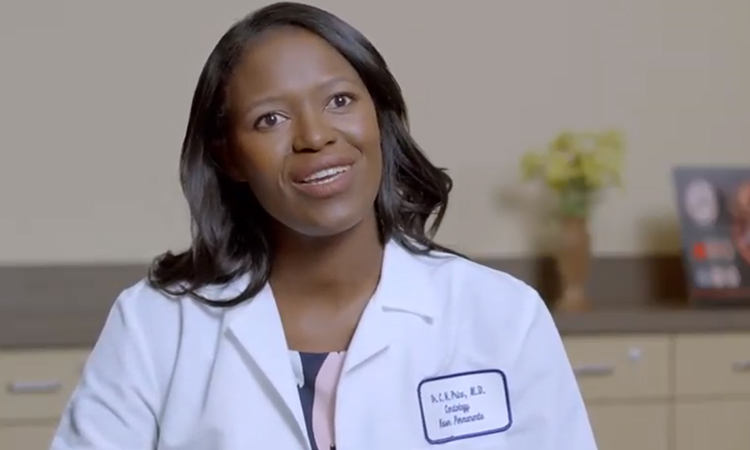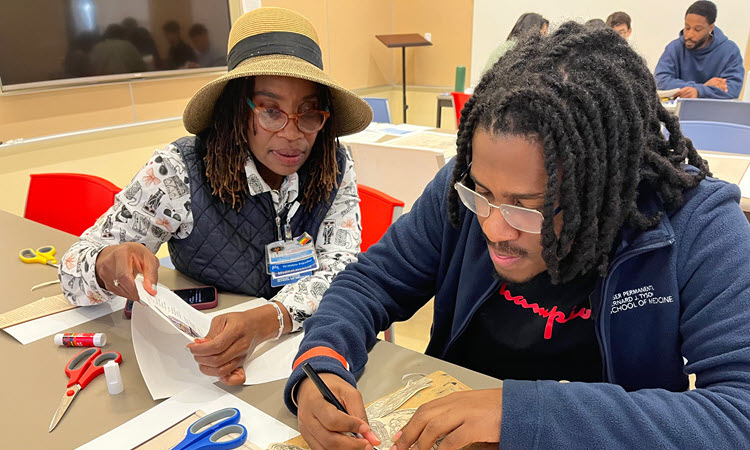In honor of International Women’s Day, which celebrates women’s achievements, recognizes challenges, and focuses greater attention on women’s rights and gender equality, we recognize those pioneering women who helped pave the way for women in medicine. These include Anandibai Joshi, Keiko Okami, and Sabat Islambouli, who were students at Women's Medical College of Pennsylvania in 1885. Unable to study medicine in their respective home countries of India, Japan, and Syria, they defied the expectations of society and their families to travel abroad to attend the first women’s medical college in the world. All three went on to become the first women physicians licensed in western medicine in their home countries.
Today, it is not an anomaly for women to pursue careers in healthcare. In fact, women represent close to 70 percent of the global healthcare workforce, according to research from the World Health Organization.
Dr. Chileshe Nkonde Price, Assistant Professor at the Kaiser Permanente Bernard J. Tyson School of Medicine and a board-certified cardiologist with the Southern California Permanente Medical Group, had two role models who exposed her to the possibilities of a medical career: her parents.
“I like to joke that I grew up in a hospital. My parents were young, busy doctors who blended the magic of parenting us with the passion and purpose of being brilliant physicians,” she said. “Our family photos include me strapped to my mother’s back as she read for exams, my bookshelf was a mix of medical textbooks and Dr.Seuss, and my parents patiently answered my endless questions about what they did all day.”
Her journey to becoming a cardiologist was equally influenced by her family. When she was a first-year medical student at the University of Cambridge, her father had a heart attack and needed to undergo bypass surgery. Inspired by the care he received, she wanted to learn everything about the heart and “do what that cardiologist had done for me and my family.”
Price went on to earn a BA, summa cum laude, and MA from the University of Cambridge. She also holds a MBBS from the University of College London, a MRCP from the Royal College of Physicians of London, and a MSHP from the University of Pennsylvania.
Much like her parents, she balanced starting a family and raising children while pursuing her specialty. It was not easy.
“There are many challenges to being a female cardiologist, even though the research says that female patients do better when they are cared for by female cardiologists,” Price said. “I had my children during my fellowship at the Yale University School of Medicine, which was very tough, especially when I was a junior attending with an infant and toddler.”
Luckily, she had two consecutive women Cardiology Section Chiefs, who served as role models, including her current chief, Dr Marta Vakulenko , a dual board-certified cardiologist and electrophysiologist who is also an energetic and committed parent and spouse, said Price.
“I know this is rare. Lack of women role models, especially in subspecialities, is a challenge,” she said. “My dream is that we would not exist in mentorship dyads or triads, but rather that we would all have access to ‘mentorship teams,’ where we strengthen one another, modeling for one another, and strengthening our male colleagues too.”
Price would also like to see simulation centers available in all clinical practices and fellowship programs, citing research from an interventional cardiology fellowship training in France that uses an interventional cardiology simulator, Mentice G5 , for training with access to instruction made available to pregnant cardiology fellows.
“My sense is this type of intervention would increase the percentage of women in the field of cardiology and cardiology subspecialties, diversifying the cardiovascular workforce,” she said.
She advises that women pursuing a medical career who are considering having or adopting a child not hold off on family planning, acknowledging that there is truly no “ideal time” to do so given the long hours and demanding training involved in becoming a physician.
Students interested in following her path to cardiology are best served by focusing on the specialty early in their residency, ideally during their first year, she said. From a practical standpoint, this gives students an opportunity to build relationships within the cardiology division at their residency, which, she said, is a strong part of a fellowship application.
“You want to position yourself to be broadly exposed to the variety of cardiology subspecialties, as you develop your cardiology ‘phenotype,’ but also because it’s so important to establish mentors,” she said.
For aspiring or first-year medical students, whatever their gender identity or potential medical focus, Price offers three tips to help weather the stress of medical school and thrive.
“Develop a mind-set where you measure yourself against yourself, and not anyone else. Getting into medical school is tough. Everybody is as brilliant as you,” she said. “As Oscar Wilde famously said,, ‘Be yourself, everyone else is already taken.’”
This is especially important, Price explained, as the transition to medical school involves learning how to study, actually studying, and then learning to be all right when you score lower than expected.
“It happens to all of us. Before every one of my greatest successes, there have been failures,” she said.
It also helps to have something outside of medicine that refreshes you, which is important not only for yourself, but your future patients, she explained.
Her final bit of advice touches on what guided her during her medical journey.
“The patients you will take care of have already been chosen. They are living their lives or just being born, getting married or divorced, having kids, traveling the world, pursuing their passions until that fateful day when your worlds interact and you become their doctor,” she said. “This helped me pick my residency, my fellowship, and my future jobs and is one of the most amazing pieces of advice I was given in medical school.”
To learn more about Dr. Chileshe Nkonde Price and her compassionate and innovative approach to cardiac care, please see a video segment dedicated to her work with Kaiser Permanente.



